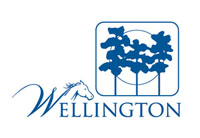The Wellington Village Council gave preliminary approval Tuesday to maintain its property tax rate at 2.5 mills, the same rate as the previous three years.
But for the first time in five years, Wellington will see an uptick in its property tax revenue.
Council members voted 4-1 to approve the preliminary rate. Vice Mayor Howard Coates was the lone dissenter.
Coates said that he thought that his colleagues on the council should vote to lower the rate because of additional revenue.
“We sell 2.5 [mills] like we’re treating taxpayers the same as in previous years,” he said. “I think it should be lowered.”
The “truth in millage” or TRIM rate of 2.5 mills means a property tax of $2.50 for every $1,000 of taxable value. At that rate, the owner of a home assessed at $150,000 after exemptions would pay $375 in village property taxes next year.
State law requires the village to set its preliminary tax and assessment rates in July. Municipalities may lower the rates before final adoption in September but cannot raise them.
Next year’s proposed budget of $72.03 million is down $1.9 million or 2.6 percent from last year, Director of Financial Management Mireya McIlveen told council members.
The budget as proposed is made up of $38.2 million in governmental funds, down $672,000 from last year, and $15.6 million in enterprise funds, down $66,000.
Capital projects are budgeted at $3.3 million, down $1.3 million, and utility capital projects make up $5.3 million of the budget.
Wellington will retain 263 employees, with three of those positions becoming full-time rather than part-time. The budget also includes 3 percent merit raises and covers increases in employee benefits for insurance and retirement.
Public hearings on final adoption of the proposed budget and tax rates will take place in September, when the council will make its final decision.
At the proposed tax rate, Wellington will take in about $12.88 million in property taxes — $120,000 more than last year.
Wellington’s total taxable value this year is $5.42 billion.
“That’s the first increase in taxable value since 2007 or 2008,” McIlveen said, noting that the average home in Wellington is assessed at about $250,000.
Councilwoman Anne Gerwig asked whether Wellington was using any of its rate stabilization funds. McIlveen said it had not, but that there is about $600,000 budgeted to cover any revenue shortages.
“The year is not over, so we’re not sure what will happen between now and then,” she said. “At this time, we are not foreseeing using it for revenue shortage.”
Coates pointed out that Wellington would be collecting more tax revenue from its residents at the proposed rate.
“It would actually result in an increase of tax revenue,” he said. “If we’re telling our taxpayers that we’re treating them the same as last year, that rate should really be 2.47.”
McIlveen agreed, but she pointed out that property valuations would affect individual taxes.
“Someone’s taxable value could go down, in which case 2.5 would be a decrease. Conversely, there could be an increase,” McIlveen said.
Mayor Bob Margolis reminded council members that the TRIM rate was merely preliminary and sets the highest rate Wellington can charge. “We will have a lot more discussion with regard to the budget,” he said.
McIlveen pointed out that Wellington collects less tax from residents than the county or the school board.
“About 9.7 percent of the tax bill is our property taxes,” she said. “With solid waste and property assessments, it’s about 16 percent of the total.”
But Coates said he thought the council should approve a lower preliminary rate. “This year, the rollback rate, unlike previous years, is lower,” he said. “I won’t support a rate of 2.5 [mills].”
Willhite made a motion to approve the TRIM rate, which carried 4-1 with Coates opposed.
In other business, council members voted unanimously to maintain solid waste collection and recycling rates at $160 per unit for curbside service and $125 for containerized service, the same as last year.








